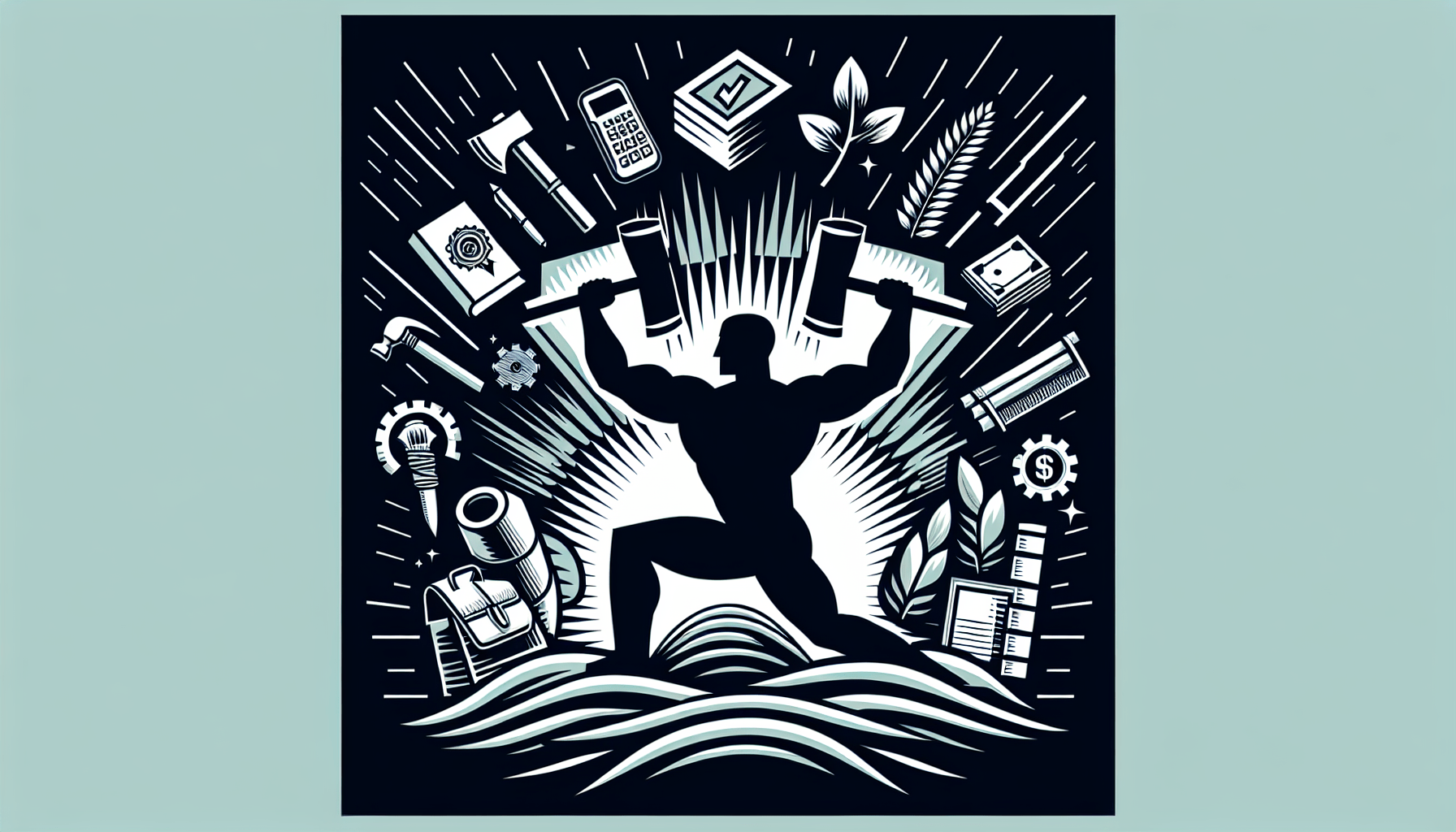In today’s uncertain times, it is crucial to be prepared for any potential economic disruptions. Whether you are a seasoned prepper or new to the concept, this article aims to provide you with the best strategies for prepper economic recovery. By implementing these tactics, you can ensure that you are well-equipped to navigate financial challenges and safeguard your resources. From creating a comprehensive emergency fund to diversifying your income streams, this article covers a range of practical approaches to help you thrive even in the face of economic uncertainty.

1. Assessing the Current Situation
Evaluating Personal Finances
To effectively navigate through any economic crisis, it is crucial to start by assessing your personal finances. Take a comprehensive look at your income, expenses, assets, and liabilities. This evaluation will help you gain a clear understanding of your financial standing, which is the foundation for building a resilient financial plan.
Analyzing the Economic Landscape
Understanding the broader economic landscape is equally important. Stay informed about the latest economic trends and indicators to gauge the potential impact on your financial security. Monitor indicators such as unemployment rates, inflation, and consumer confidence. By keeping a pulse on the economy, you can make informed decisions and adjust your financial strategies accordingly.
2. Building an Emergency Fund
Setting Financial Goals
Start by setting clear financial goals that align with your long-term vision. Consider your short-term and long-term objectives, such as creating an emergency fund, paying off debts, or securing a stable retirement. Setting specific and achievable goals will guide your financial decisions and help you prioritize your actions.
Creating a Budget
Developing a comprehensive budget is crucial for achieving financial stability. Track your income and expenses, and identify areas where you can reduce unnecessary spending. Allocate a portion of your income towards essential needs, savings, and debt repayment. By creating a budget, you gain control over your finances and ensure that your money is directed towards your financial goals.
Cutting Expenses
To build your emergency fund, it is essential to reduce expenses where possible. Evaluate your current spending habits and identify areas where you can make cuts without sacrificing your quality of life. Consider cutting back on non-essential items, such as dining out or subscription services. Redirecting these funds towards your emergency fund will help you accumulate enough savings to weather any economic uncertainties.
Increasing Income
Another effective strategy to build your emergency fund is to explore opportunities to increase your income. Consider taking on a side job or freelancing to supplement your primary income. Explore your skills and expertise to identify marketable services you can offer. By increasing your income, you accelerate the process of building your emergency fund and strengthening your financial stability.
3. Establishing a Barter Network
Identifying Valuable Skills and Resources
Take inventory of your skills, talents, and resources that could be valuable in a barter economy. Identify what you can offer in exchange for goods or services. Whether it’s expertise in gardening, carpentry, or other skills, leveraging your capabilities will enable you to participate in a barter network effectively.
Connecting with Like-minded Individuals
Building a strong network of like-minded individuals is essential for successful bartering. Seek out community groups, online forums, or local gatherings where individuals interested in bartering or prepping convene. Engaging with these individuals will not only expand your network but also provide opportunities for mutually beneficial exchanges.
Negotiating Fair Trades
When participating in a barter network, it is crucial to negotiate fair trades. Ensure that both parties involved find the exchange equitable. Be open to negotiating values and consider the current needs and circumstances of those you barter with. Maintaining fairness and building trust within your barter network will create a sustainable and supportive economic community.

4. Investing in Tangible Assets
Understanding the Value of Tangible Assets
When seeking economic recovery strategies, investing in tangible assets can provide stability and security. Tangible assets, such as real estate, precious metals, or commodities, can hold their value and serve as a hedge against inflation. Understanding the value and benefits of these assets will aid in making informed investment decisions.
Diversifying Investments
To minimize risk and protect your wealth, diversify your investment portfolio. Spread your investments across different asset classes to reduce the impact of any market fluctuations. Consider investing in stocks, bonds, real estate, and precious metals. By diversifying, you ensure that your financial security is not solely dependent on a single investment or industry.
Considerations for Different Asset Classes
Each asset class has unique characteristics and considerations. Real estate, for example, provides both income potential and appreciation over time. Precious metals, such as gold and silver, historically hold their value and act as a store of wealth. Understand the specific risks and benefits associated with each asset class before making investment decisions.
Storing and Protecting Assets
Safeguarding your tangible assets is crucial for maintaining their value and protecting your wealth. Consider secure storage options for precious metals or valuable possessions. Utilize robust security systems to protect your real estate investments. By taking proactive measures to safeguard your assets, you ensure their longevity and maintain your financial security.
5. Developing Long-term Self-sustainability
Growing Food through Gardening or Farming
Preparing for economic recovery includes creating long-term self-sustainability. Start by learning about gardening or farming techniques that suit your climate and available space. Cultivating your own fruits, vegetables, and herbs not only ensures a constant food supply but also reduces reliance on external sources.
Raising Livestock
If suitable for your circumstances, consider raising livestock as a sustainable food source. Chickens, rabbits, or goats can provide eggs, meat, and dairy products. However, ensure you have the necessary space, resources, and knowledge to care for these animals properly.
Harnessing Renewable Energy Sources
To enhance self-sustainability, explore renewable energy options. Installing solar panels, wind turbines, or utilizing hydroelectric power can reduce your dependence on the traditional energy grid. This not only provides long-term cost savings but also allows you to contribute to a more sustainable environment.
Acquiring Knowledge and Skills
Developing self-sustainability requires acquiring knowledge and skills in various areas. Take advantage of educational resources, online courses, or workshops to learn about sustainable practices, permaculture, or alternative energy sources. Building a broad skill set increases your ability to adapt and thrive in any economic scenario.
6. Exploring Alternative Income Streams
Starting a Small Business
Consider starting a small business that aligns with your skills, interests, and market demands. Identify gaps or emerging opportunities in your local community and create a business plan to address those needs. A small business not only generates income but also provides flexibility and autonomy.
Freelancing and Consulting Opportunities
Harness your expertise and offer freelance or consulting services in your field of expertise. Leverage online platforms and professional networks to connect with potential clients and expand your client base. Freelancing and consulting allow you to capitalize on your skills while providing the flexibility to adapt to changing economic circumstances.
Monetizing Hobbies and Crafts
Do you have a hobby or passion that can be monetized? Explore opportunities to turn your hobbies or crafts into a source of income. Whether it’s woodworking, painting, or jewelry making, there may be a market for your unique creations. Online platforms and local markets provide avenues to showcase and sell your products.
Capitalizing on Prepper-related Demands
As a prepper, you possess valuable knowledge and skills that can be monetized. Consider providing prepper-related services such as survival training, emergency preparedness consulting, or organizing prepper-focused events. Sharing your expertise and catering to the growing interest in prepping can generate income while assisting others in their preparedness journey.
7. Protecting Wealth through Precious Metals
Understanding the Role of Precious Metals in Economic Recovery
During times of economic uncertainty, precious metals have historically served as a safe-haven investment. Understanding the role of precious metals, such as gold and silver, in economic recovery is essential. These metals act as a hedge against inflation and can preserve wealth when traditional investments face volatility.
Investing in Gold, Silver, and other Metals
Diversifying your investment portfolio to include precious metals can protect your wealth. Consider investing in gold, silver, or other metals based on your risk tolerance and investment goals. Research the market trends, historical performance, and storage requirements before making any investment decisions.
Storing and Safeguarding Metals
When investing in precious metals, secure storage is crucial. Consider utilizing a bank safety deposit box or installing a home safe with proper security measures. Keep your metals protected from theft, damage, or loss. Additionally, consider insuring your precious metal investments to mitigate potential risks.
8. Engaging in Local Economy
Supporting Local Businesses and Farmers
In times of economic recovery, supporting local businesses and farmers is pivotal. Patronize local stores, restaurants, and farmers’ markets to boost the local economy and foster community resilience. By choosing local products and services, you create a sustainable and interdependent local ecosystem.
Participating in Community Events and Initiatives
Actively participate in community events and initiatives to strengthen local connections. Engage in volunteer work, join local organizations, or attend neighborhood meetings. By being involved in your community, you contribute to its economic growth and build relationships with like-minded individuals.
Encouraging Local Production and Trade
Promote local production and trade by advocating for policies that support local businesses. Encourage initiatives such as community gardens, farmer’s cooperatives, or local currency systems. Supporting local production helps minimize dependence on external resources and fosters a resilient and self-sustaining local economy.
9. Educating Oneself about Financial Management
Learning about Personal Finance Principles
Take the time to educate yourself about personal finance principles. Understand concepts such as budgeting, saving, investing, and debt management. Numerous books, online resources, and educational courses are available to help you develop a solid foundation in financial management.
Studying Economic Trends and Indicators
Stay informed about current economic trends and indicators. Follow reputable sources for insights into market conditions, inflation rates, and geopolitical developments. This knowledge will enable you to make informed decisions and adapt your financial strategies accordingly.
Exploring Investment Opportunities
Expand your knowledge of investment opportunities by researching different sectors and asset classes. Learn about stocks, bonds, real estate, mutual funds, and other investment vehicles. Diversifying your investment portfolio will help protect and grow your wealth over time.
Understanding Risk Management
Develop an understanding of risk management strategies to safeguard your financial security. Assess the risks associated with various investments and develop contingency plans. By understanding and actively managing risks, you can minimize potential losses and protect your assets.
10. Building a Collaborative Prepper Network
Joining Prepper Communities and Groups
Connect with prepper communities and groups to build a collaborative network. Join online forums, attend workshops, or participate in local meetups to meet fellow preppers. Sharing experiences, knowledge, and resources with like-minded individuals fosters a sense of community and strengthens your overall preparedness.
Sharing Knowledge and Resources
Within your prepper network, actively share knowledge, skills, and resources. Collaborate on training exercises, trade expertise, and exchange resources to enhance your collective preparedness. An interconnected prepper network helps distribute the workload and ensures comprehensive preparation.
Collaborating on Preparation Strategies
Work collaboratively with your prepper network to develop effective preparation strategies. Pool resources, brainstorm ideas, and develop contingency plans together. By leveraging the expertise and creativity of your network, you can enhance your preparedness and navigate through economic recovery with greater resilience.
In conclusion, navigating economic recovery as a prepper requires a multifaceted approach. Assessing your financial situation, building an emergency fund, establishing a barter network, investing in tangible assets, developing self-sustainability, exploring alternative income streams, protecting wealth through precious metals, engaging in the local economy, educating yourself about financial management, and building a collaborative prepper network are key strategies that can contribute to your economic recovery and long-term preparedness. By implementing these strategies with intention and adaptability, you can navigate through economic uncertainties with resilience and confidence.
